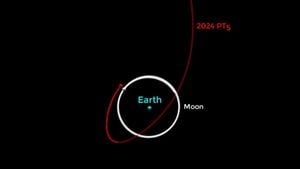Dark matter is one of the universe's greatest mysteries, making up about 27% of its mass, yet remaining elusive to direct observation. A new wave of research proposes intriguing candidates to account for this hidden mass, with tiny primordial black holes taking center stage as potential culprits. These black holes, theorized to have formed shortly after the Big Bang, could be much smaller than those typically known, even approaching the size of atoms, yet they could contain masses comparable to asteroids. If correct, this theory might not only shed light on the nature of dark matter but also explain some peculiar orbital behaviors observed within our solar system.
Recent studies have sparked excitement among physicists, particularly one published by researchers from the Massachusetts Institute of Technology (MIT). This study suggests these primordial black holes could pass through regions of the solar system, including Mars, and introduce measurable gravitational disturbances—effects akin to tiny wobbles observable with advanced instruments. Sarah Geller, co-author of the study, notes: "If there are lots of black holes out there, some of them must surely pass through our backyard every now and then." If these primordial black holes exist, it would mean at least one could pass through the inner solar system every decade.
The concept of primordial black holes takes us back to the moments following the Big Bang when the universe was extremely dense and hot. Under certain conditions, random fluctuations may have triggered the collapse of matter, leading to the formation of these diminutive yet dense black holes. The question researchers encounter now is how to detect such small objects as they navigate through the vast emptiness of space.
The study argues these primordial black holes might disrupt the orbits of nearby planets. For example, the gravitational pull from one of these black holes could result in detectable wobbles of Mars—subtle changes observable over time. Beneath this notion lies the captivating idea of using gravitational effects alone to probe the existence of dark matter, which remains conspicuously absent from various particle searches.
Researchers employed sophisticated computer modeling to simulate how often these black holes would swoop through the solar system. Their calculations suggest not only the frequency of these events but also indicate potential detection methods. Utilizing orbital data, scientists would look for disturbances over time, separately identifying whether such changes originate from asteroids—typically observed using telescopes—or from elusive primordial black holes.
Benjamin V. Lehmann, another co-author from MIT, explained how tracking the wobble patterns could yield information about these objects. By recording the gravitational influence of passing black holes against the backdrop of known asteroid paths, researchers could distinguish them from other cosmic phenomena. These methods promise rich informational returns, offering insights not just about dark matter but about the primordial conditions of the universe.
Complicately intertwined with this topic, other studies have sprung up, indicating gravitational waves may hide signatures of dark matter. This hypothesis arrives with due credibility as detections from the Laser Interferometer Gravitational-Wave Observatory (LIGO) have been rising, hinting at underlying physics yet to be fully understood.
While some experts remain cautious, asserting more research is needed before drawing broad conclusions, the cumulative findings highlight the significance of primordial black holes within the dark matter paradigm. Geller emphasizes, "We are not making any of the following claims—that primordial black holes definitely exist, or they represent all of dark matter; rather, we are exploring their potential as viable candidates."
Many physicists stand by the primordial black hole hypothesis, especially since traditional searches for dark matter particles, such as weakly interacting massive particles (WIMPs), have returned disappointing results. With new models and simulations, the investigation of these early black hole forms seems to gain traction.
The timing of these discussions fits neatly with increasing realms of advanced detection methods. Notably, the European Space Agency is developing new gravitational wave observatories like LISA, expected to play a pivotal role in advancing our knowledge of these cosmic mysteries. The interaction of dark matter via gravity instead of any force might finally reconcile the historical challenges of verifying dark matter’s many proposed identities.
From our solar system to the cosmic web, the quest for comprehension of dark matter continues, underlining the importance of not only theoretical work but also experimental validation. With this influx of innovative research and technology, the scientific community finds itself at the brink of potentially transformative discoveries about the universe's dark corners.
At the core of this renaissance is the tantalizing prospect of primordial black holes. These tiny entities—if they exist—carry with them the story of our universe's origins. So, the hunt continues, with astronomers refining strategies to detect these potential intruders and deepen our grasp of dark matter's elusive nature.



